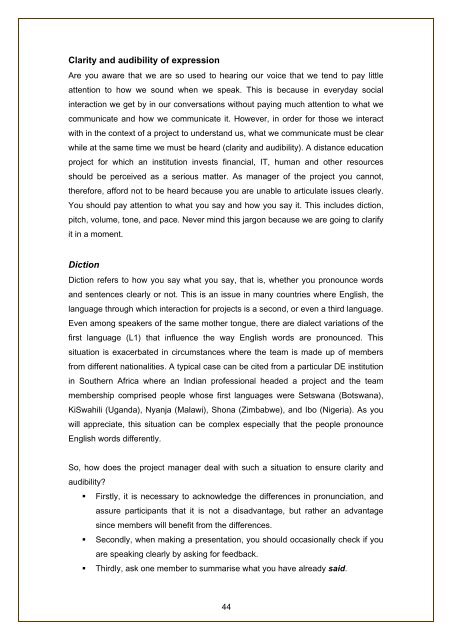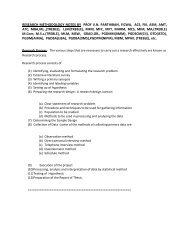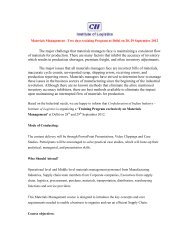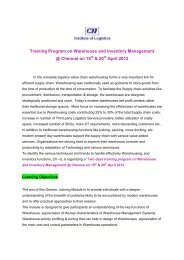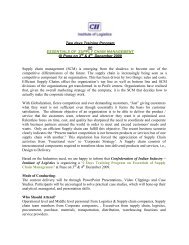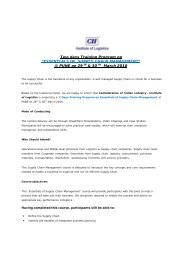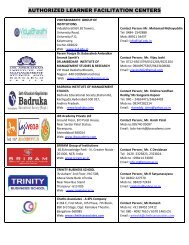successful project management - Commonwealth of Learning
successful project management - Commonwealth of Learning
successful project management - Commonwealth of Learning
You also want an ePaper? Increase the reach of your titles
YUMPU automatically turns print PDFs into web optimized ePapers that Google loves.
Clarity and audibility <strong>of</strong> expression<br />
Are you aware that we are so used to hearing our voice that we tend to pay little<br />
attention to how we sound when we speak. This is because in everyday social<br />
interaction we get by in our conversations without paying much attention to what we<br />
communicate and how we communicate it. However, in order for those we interact<br />
with in the context <strong>of</strong> a <strong>project</strong> to understand us, what we communicate must be clear<br />
while at the same time we must be heard (clarity and audibility). A distance education<br />
<strong>project</strong> for which an institution invests financial, IT, human and other resources<br />
should be perceived as a serious matter. As manager <strong>of</strong> the <strong>project</strong> you cannot,<br />
therefore, afford not to be heard because you are unable to articulate issues clearly.<br />
You should pay attention to what you say and how you say it. This includes diction,<br />
pitch, volume, tone, and pace. Never mind this jargon because we are going to clarify<br />
it in a moment.<br />
Diction<br />
Diction refers to how you say what you say, that is, whether you pronounce words<br />
and sentences clearly or not. This is an issue in many countries where English, the<br />
language through which interaction for <strong>project</strong>s is a second, or even a third language.<br />
Even among speakers <strong>of</strong> the same mother tongue, there are dialect variations <strong>of</strong> the<br />
first language (L1) that influence the way English words are pronounced. This<br />
situation is exacerbated in circumstances where the team is made up <strong>of</strong> members<br />
from different nationalities. A typical case can be cited from a particular DE institution<br />
in Southern Africa where an Indian pr<strong>of</strong>essional headed a <strong>project</strong> and the team<br />
membership comprised people whose first languages were Setswana (Botswana),<br />
KiSwahili (Uganda), Nyanja (Malawi), Shona (Zimbabwe), and Ibo (Nigeria). As you<br />
will appreciate, this situation can be complex especially that the people pronounce<br />
English words differently.<br />
So, how does the <strong>project</strong> manager deal with such a situation to ensure clarity and<br />
audibility?<br />
• Firstly, it is necessary to acknowledge the differences in pronunciation, and<br />
assure participants that it is not a disadvantage, but rather an advantage<br />
since members will benefit from the differences.<br />
• Secondly, when making a presentation, you should occasionally check if you<br />
are speaking clearly by asking for feedback.<br />
• Thirdly, ask one member to summarise what you have already said.<br />
44


